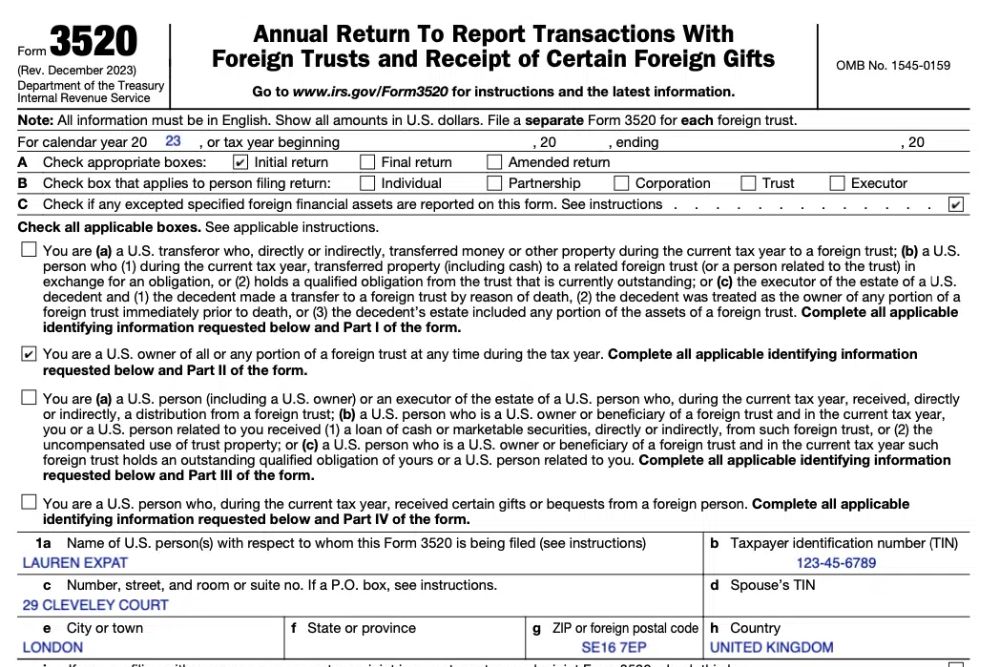Taxes on Foreign Inheritance: What Do You Need To Declare?

If you’ve received an inheritance from abroad, from a non-US person, you may wonder whether the IRS expects you to pay a foreign inheritance tax.
Foreign inheritance tax involves the rules and reporting requirements when a US person inherits assets from a foreign source. A US person includes US citizens, residents who meet the substantial presence test, Green Card holders, and certain nonresident aliens.
When it comes to handling the complexities of foreign inheritance taxes, Greenback Expat Tax Services is your go-to resource. We’ve helped over 18,000 expats navigate their tax obligations, and our team of tax professionals has the experience to tackle your unique situation. We really get the nuances of expat taxes as many of us have lived abroad ourselves.
In this article, we’ll go over the IRS tax rules related to foreign inheritance tax and how to make sure you comply with all filing requirements.
Key Takeaways
- An estate tax is a tax based on the property that belonged to a deceased person. An inheritance tax is a tax imposed on a person who received the property of a deceased person.
- In general, US Federal Estate Taxes only apply when a deceased person had property valued at over $12 million USD.
- There is no federal inheritance tax, but several states and the District of Columbia do have inheritance taxes.
Will I Be Taxed if I Receive Money From Overseas?
The IRS won’t tax you on money you receive from any nonresident alien overseas. However, if the gift exceeds $100,000, you will need to file a Form 3520 (you won’t be taxed—you just need to report it.)
You may be required to pay taxes on the inherited assets, though, depending on what state you live in. Washington, D.C., imposes inheritance tax, for instance. Check your state tax laws to find out if you’ll have to pay tax on a foreign inheritance.
The US would only impose a tax on the estate for any property with a “US situs”—not on a foreign estate located in a foreign country. US situs means that an asset is a real and tangible property—typically real estate—located within the United States. For example, if a non-US person left a US citizen a house in California, that would qualify as a US situs asset. This property would be subject to possible estate tax.

But again, for any assets that don’t qualify as US situs, no federal inheritance or estate tax will apply. (Though you may owe state taxes on assets inherited from a foreign source—this will depend on your specific circumstances.)
What To Report as Foreign Inheritance
Foreign inheritance tax reporting requirements mostly depend on how much inheritance you receive. Let’s go over the threshold for foreign inheritance and some of the most common scenarios for what to report to the IRS for foreign inheritance tax.
Foreign Gifts of More Than $100,000
If you receive a gift or inheritance valued at more than $100,000 from a non-US person (from a foreign person or their estate), you will need to file IRS Form 3520: Annual Return to Report Transactions with Foreign Trusts and Receipt of Certain Foreign Gifts at the same time as your individual income tax return. For most taxpayers, that will be April 15th.
This amount can also include multiple gifts or bequests received during the year. For example, let’s say a non-US person gave you a gift valued at $30,000. Then, during the same year, a separate non-US person left you an inheritance of $80,000. Because the total amount you received in one year is greater than $100,000, you would be required to report both through Form 3520.
The good news is that this is an informational return, not a tax return. You’re simply reporting the gift or inheritance, not paying taxes on it. However, if you fail to file Form 3520 accurately or on time, you may be subject to a fine of up to 35% of the gross value of the gift, inheritance, or both.
Foreign Trusts
In some cases, your foreign inheritance may be placed in a trust.
If any portion of a foreign trust has an owner who is a US person, the trust must file Form 3520-A: Annual Information Return of Foreign Trust With a US Owner by March 15th to report this.
The US owner is ultimately responsible for ensuring that this form is filed. If the trust’s representative or trustee fails to file Form 3520-A by the March 15th deadline, then the US owner must file a different form themselves: a substitute form, 3520-A.
Like Form 3520, Form 3520-A is merely an informational return. You won’t owe anything on it. But if you fail to file it accurately and on time, you may be subject to a fine of $10,000—or 5% of the gross value of the inheritance, whichever is greater.
Foreign Bank Accounts Containing More Than $10,000
Let’s say you keep the money you receive from the inheritance in one or more foreign bank accounts. If the combined amount of money you have in those foreign bank accounts exceeds $10,000, you will need to report this by filing a Report of Foreign Bank and Financial Accounts (FBAR) using FinCEN Form 114.
Once again, this is an informational return and doesn’t create a tax liability. You can’t file it with your individual income tax return. Instead, this form is filed electronically through the FinCEN BSA E-Filing System.
The due date to file your reporting for a given year is April 15th of the following year. But if you miss that deadline, it will automatically extend to October 15th. You won’t need to file a request for an extension.
Dreading the last minute scramble pulling together your tax documents? Despair no more! This simple checklist lists the documents you need to have on hand when preparing to file.

Offshore Assets Worth More Than $200,000
If your inheritance brings the value of your total offshore assets above certain thresholds, you will have to file Form 8938: Statement of Specified Foreign Financial Assets. The threshold depends on your filing status.
For example, if you are an unmarried US person living outside of the United States, you would be required to file Form 8938 if your combined offshore assets were worth more than $200,000 on the last day of the tax year or more than $300,000 at any other time of the tax year.
To learn what requirements apply to you, see the instructions for Form 8938 provided by the IRS. If you are required to file Form 8938, it will be due at the same time as your individual income tax return. (April 15th, for most US taxpayers.) Failing to submit an accurate tax filing form by that deadline may result in an initial fine of $10,000. You will then have 90 days to file an accurate form after being notified by the IRS.
If you still haven’t filed after 90 days, you may be fined an additional $10,000 for every 30 days following, up to a maximum of $50,000.
Transferring Money to US Bank Accounts
If you transfer any of your inheritance to a US bank account, you won’t have to file anything out of the ordinary. If you bring the money into the US in the form of cash, you will need to use FinCEN Form 105 to declare it.
This is required so that the US Department of the Treasury can investigate any possible red flags for illegal activity, such as money laundering. Don’t worry, though. As long as you’re operating within the US and international tax laws, you’re safe.
Do US citizens pay tax on foreign inheritance?
No, most expatriates who are US citizens won’t have to pay US tax on a foreign inheritance. In fact, the IRS rules on foreign inheritance are the same for expats as for US persons living within the United States who inherit money from another country. You may need to file one or more of the informational forms listed above, but it’s unlikely that you’ll have any expat tax liability.
Of course, for both expats and US residents, if you accrue any income from your inheritance (such as through investing), you may owe taxes as a result. For more on the IRS rules on foreign inheritance, check the IRS website.
Let Greenback Expat Tax Services Help You Manage Your Tax Strategy
Still have questions about the foreign inheritance tax? Want a little help with your expat taxes? We’re always happy to lend a hand, as well as with US citizens with foreign business.
Contact us, and one of our customer champions will gladly help. If you need very specific advice on your specific tax situation, you can also click below to get a consultation with one of our expat tax experts.



